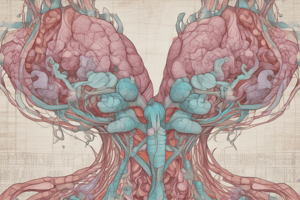Podcast
Questions and Answers
Which hormone is primarily responsible for controlling the release of thyroid hormones?
Which hormone is primarily responsible for controlling the release of thyroid hormones?
- T3
- Thyroid-Stimulating Hormone (TSH) (correct)
- T4
- Calcitonin
Which of the following is NOT a physical symptom of hyperthyroidism?
Which of the following is NOT a physical symptom of hyperthyroidism?
- Thinness (weight loss)
- Abdominal cramping (correct)
- Enlarged thyroid glands
- Soft skin
What diagnostic test shows an elevated uptake in patients with hyperthyroidism?
What diagnostic test shows an elevated uptake in patients with hyperthyroidism?
- Serum thyroglobulin test
- Fine needle biopsy
- Thyroid scan (correct)
- Plasma calcium test
Which of these symptoms is likely to indicate an increased basal metabolic rate (BMR) in hyperthyroidism?
Which of these symptoms is likely to indicate an increased basal metabolic rate (BMR) in hyperthyroidism?
In hyperthyroidism, which medication administration guideline should patients follow to decrease absorption?
In hyperthyroidism, which medication administration guideline should patients follow to decrease absorption?
Flashcards are hidden until you start studying
Study Notes
Thyroid Gland
- The thyroid gland produces thyroid hormones, including T3 and T4, and calcitonin.
- Thyroid Stimulating Hormone (TSH) regulates the release of thyroid hormones.
- Calcitonin is released when calcium levels in the blood are high, promoting calcium deposition in bones.
- Iodine is an essential element for the production of thyroid hormones.
Hyperthyroidism Diagnostics
- Hyperthyroidism is diagnosed through various tests, including:
- Low TSH levels: Indicative of thyroid overactivity.
- Elevated T3 and T4 levels: Reflecting increased thyroid hormone production.
- Elevated T3 resin uptake: Measures the ability of thyroid hormones to bind to proteins.
- Elevated thyroid antibodies: Suggest an autoimmune cause for hyperthyroidism.
- Elevated serum thyroglobulin: A protein produced by the thyroid gland.
- Radioactive iodine uptake: Assesses the thyroid gland's ability to absorb iodine.
- Fine needle biopsy: Used to examine thyroid tissue for abnormalities.
- Thyroid scan: Visualizes the thyroid gland and its activity.
Hyperthyroidism Symptoms
- Physical Symptoms: These include soft skin, hypertension (high blood pressure), exophthalmos (bulging eyes), gastrointestinal issues like diarrhea, enlarged thyroid gland, increased body temperature, shakiness, a high basal metabolic rate (BMR), excessive sweating (diaphoresis), and weight loss.
- The mnemonic SHE GETS HOT is used to remember the symptoms.
- Clinical Manifestations: These include nervousness, rapid pulse, heat intolerance, tremors, flushed skin, warm and moist complexion, and exophthalmos.
- Other Symptoms: Include increased appetite, weight loss, elevated systolic blood pressure, and cardiac dysrhythmias.
Nursing Implications
- Patients should take prescribed medications 30 minutes before meals to maximize absorption and efficacy.
Studying That Suits You
Use AI to generate personalized quizzes and flashcards to suit your learning preferences.


